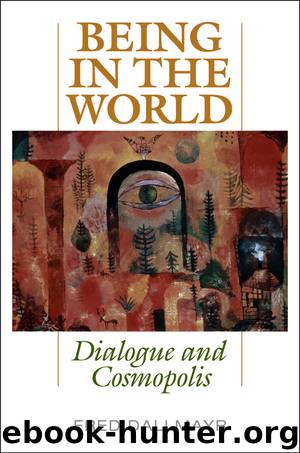Being in the World by Dallmayr Fred;

Author:Dallmayr, Fred;
Language: eng
Format: epub, mobi
Publisher: The University Press of Kentucky
Published: 2013-04-20T16:00:00+00:00
Concluding Comments
The passage just cited highlights an important difference between Taylor and Panikkar. Basically, The Rhythm of Being is an affirmation and celebration of “life” in its deeper advaitic meaning. Panikkar uses as equivalents the terms plenitude, happiness, creativity, freedom, and well-being; another customary term is flourishing (often used to translate Aristotle’s endaimonia). At another point, he introduces the word life “at the level of Being, as a human experience of the Whole”; the term here means “not only anima, animal life, but physis, natura, prakriti,” referring to “reality as a Whole.” On this issue, A Secular Age appears astonishingly (and unduly) dismissive. As Taylor notes in his introduction, in modernity “we have moved from a world in which the place of fullness was understood as unproblematically outside or ‘beyond’ human life, to a conflicted age in which this construal is challenged by others which place it … ‘within’ human life.” For Taylor (as mentioned before), the basic question raised by the modern secular age is “whether people [still] recognize something beyond or transcendent to their lives,” that is, whether their highest aim is “serving a good which is beyond, in the sense of independent of human flourishing” or involving “something other than human flourishing.” The truly believing or devout person is said to be marked by readiness “to make a profound inner break with the goals of flourishing in their own case”; unwillingness to do so is claimed to be the hallmark of “self-sufficient humanism.” In sum: “A secular age is one in which the eclipse of all goals beyond human flourishing becomes conceivable.”23
Taylor’s comments here are puzzling—and also disturbing. They are disturbing in a time when many presumably religious people are ready to throw away their lives in the hope of gaining quick access to the “beyond.” They are puzzling by jeopardizing the very meaning of faith. For most believers, salvation (or moksha) signifies precisely the highest level of flourishing and the ultimate fulfillment of life. What, then, does it mean for believers to seek something “outside or ‘beyond’ human life,” or something “transcendent to their lives”? Commonly, the antithesis of life is said to be death. Is God (the monotheistic God) then a God of death or of the dead? Clearly, this cannot be the case if we listen to Isaiah’s words: “The dead shall live, their bodies shall rise” (Isaiah 26:19). It becomes even less plausible if we recall Jesus’s provocative saying: “Follow me, and leave the dead to bury their dead” (Matthew 8:22), or his admonition that “the Father raises the dead and gives them life” (John 5:21). As it happens, Taylor himself wavers on this point and has to resort to ambivalent language. “There remains a fundamental tension in Christianity,” he writes. “Flourishing is good, nevertheless seeking it is not our ultimate goal. But even when we renounce it, we re-affirm it.” And he adds: “The injunction ‘Thy will be done’ is not equivalent to ‘Let humans flourish,’ even though we know that God wills human flourishing.
Download
This site does not store any files on its server. We only index and link to content provided by other sites. Please contact the content providers to delete copyright contents if any and email us, we'll remove relevant links or contents immediately.
| Deconstruction | Existentialism |
| Humanism | Phenomenology |
| Pragmatism | Rationalism |
| Structuralism | Transcendentalism |
| Utilitarianism |
The remains of the day by Kazuo Ishiguro(7544)
Tools of Titans by Timothy Ferriss(6938)
The Black Swan by Nassim Nicholas Taleb(6184)
Inner Engineering: A Yogi's Guide to Joy by Sadhguru(5888)
Giovanni's Room by James Baldwin(5873)
The Way of Zen by Alan W. Watts(5790)
The Six Wives Of Henry VIII (WOMEN IN HISTORY) by Fraser Antonia(4785)
The Power of Now: A Guide to Spiritual Enlightenment by Eckhart Tolle(4749)
Astrophysics for People in a Hurry by Neil DeGrasse Tyson(4614)
Asking the Right Questions: A Guide to Critical Thinking by M. Neil Browne & Stuart M. Keeley(4567)
12 Rules for Life by Jordan B. Peterson(3725)
The Ethical Slut by Janet W. Hardy(3494)
Skin in the Game by Nassim Nicholas Taleb(3456)
Housekeeping by Marilynne Robinson(3397)
The Art of Happiness by The Dalai Lama(3378)
Double Down (Diary of a Wimpy Kid Book 11) by Jeff Kinney(3267)
Skin in the Game: Hidden Asymmetries in Daily Life by Nassim Nicholas Taleb(3259)
Walking by Henry David Thoreau(3228)
12 Rules for Life: An Antidote to Chaos by Jordan B. Peterson(3197)
